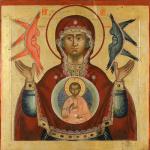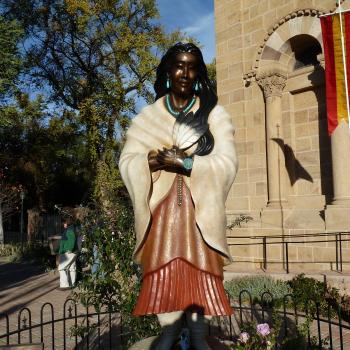Today’s post was written by guest contributor Jon Paul Siskey, Jr.
Palm Sunday is upon us.
Although we all know that we are to hear of Our Lord’s Passion in the gospel readings, we probably aren’t as aware of how it ties in to the responsorial psalm we are to hear as well. But the first Christians knew well how important Psalm 22 is in understanding The Passion of Our Lord; Jesus himself thought it important enough to quote it from the cross in his cry of divine abandonment. Why is that? A few reflections on this may help us to more fully enter into Palm Sunday.
Psalm 22 is a psalm of lament, but it is a rather unusual one.
It begins with, “My God, my God, why have you abandoned me?” (v.1) He declares “My God, I call by day, but you do not answer.” (v.3) That the psalm begins with a high degree of pain is not in itself unusual; plenty of psalms of lament recount heart wrenching pain. But what is unusual is how sharp the following prayers and praises are from the lament. Calling on his fellow Israelites to praise the Lord, he announces that “God has not spurned or disdained the misery of this poor wretch, Did not turn away from me, but heard me when I cried out” (v.25). After appealing to his fellow Jews and recalling his own situation before God, the psalmist then calls upon the entire world to worship the Lord: “All the ends of the earth will worship and turn to the Lord; All the families of nations will bow low before you. For kingship belongs to the Lord, the ruler over the nations.” (v.28-29) That the psalmist begins in the abyss but ends with God’s lordship over all of creation gives it a unique eschatological character: it portrays God’s purposes for creation. Much of the Old Testament is given deeper significance when used in the New Testament, but, while this is also true of Psalm 22, it also seems like a passage of scripture deliberately chosen by Jesus on account of its uniqueness. With this in mind, Jesus’ quotation of the psalm can be examined closer.
This Sunday’s gospel reading comes from St. Luke, which does not include the oft-quoted lines from Jesus, “My God My God, why have you forsaken me?” All the same, the casting of lots for garments coupled with the above quotation in St. Matthew and St. Mark, show the attempt of the authors of the synoptic gospels to read the Passion in light of Psalm 22, and vice versa; to see how this is done, it is important to see what transpires in Psalm 22 and the passion narrative alike. The casting of lots for garments and the savage mockery by his peers show up both in Psalm 22 and in St. Luke’s passion narrative, and, for this reason, St. Jerome sees the psalm written in the person of Jesus in addition to David. In addition, Psalm 22’s overarching context is that of a righteous person suffering, crying out for divine vindication, which happens later in the Psalm, along with Gentiles being included in the celebration. This is paralleled in Jesus’ ministry, as the suffering servant who is vindicated in his resurrection, broadening his salvific will to the Gentiles. A reader of St. Luke’s gospel who knows the Jesus story can rightly read Psalm 22 as an outline of Jesus’ death and resurrection, which lead to a mission to the Gentiles. In quoting the opening line of Psalm 22, with the broader context in view, it is clear that Matthew interpreted the crucifixion in light of the Psalm.
Jesus’ fulfillment of Psalm 22 highlights the degree to which God speaks to his people through his Word.
Although a deliberate quotation of scripture, it was also the means by which Jesus expressed his profound agony. This illustrates that, even in the life of the God-man, faithfulness to God’s Word is not incompatible with human experience. In this, even a cry of pain can be transfigured into an act of worship. This makes the scriptures accessible to people in all walks of life, allowing the biblical story to become our story as well. This Sunday we are shown darkness in the responsorial psalm and in the gospel reading; but readers paying attention to the full scope of the psalm will see the degree to which this darkness is that which precedes the glorious light. Ponder your own darkness right now, the little deaths you feel yourself dying each day. Consider the various moments in your life when you, whether you’d like to admit it or not, you find yourself crying out to the Lord, “why have you forsaken me?” Do not be afraid to ask God that question, because in so doing, you find yourself praying with King David and the Lord Jesus. You find yourself in darkness, yes, but the darkness which precedes light. Good Friday is coming soon, but Easter Sunday is not far behind.
Jon Paul Siskey Jr. has a BA in philosophy from the University of Dallas. When he’s not “forgetting” to pray or watching Arrested Development reruns, he’s studying for the LSAT in hopes of becoming an attorney one day. You can find him on Twitter at @feralspamlet.
Image courtesy of Wikimedia Commons https://commons.wikimedia.org/wiki/File:Entry_of_Jesus_Christ_into_Jerusalem.jpg













